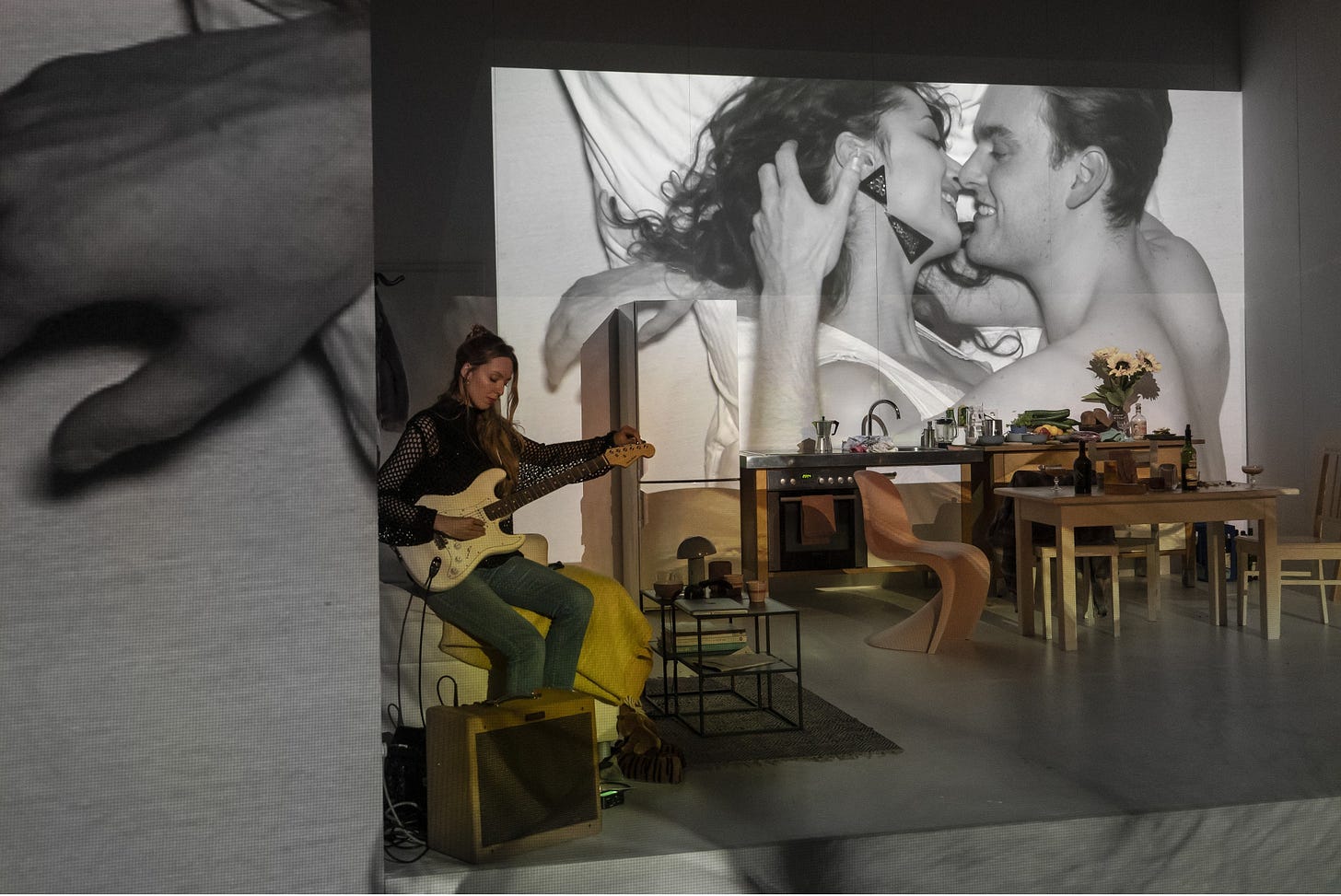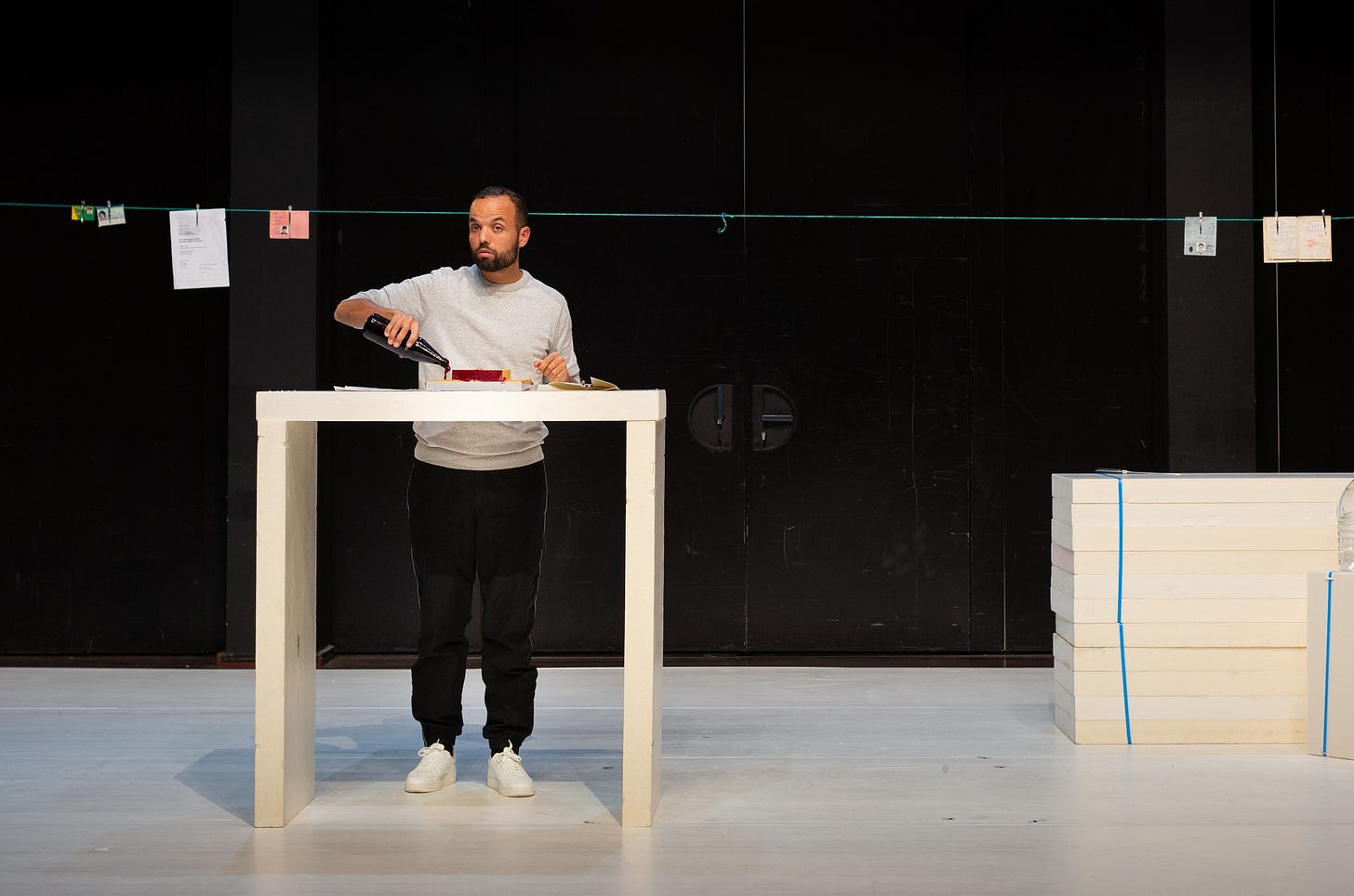And then she breastfed the samovar: Dresden's Fast Forward festival
On four invigorating days at the festival for young European directors.
Welcome to Café Europa, a weekly newsletter dedicated to European theatre.
This week I was in Dresden for Fast Forward, a festival of work by young European directors. I was moderating a panel on Staging Woyzeck with Katharina Stoll from the collective Glossy Pain and Lily Sykes, resident director at the Staatsschauspiel Dresden, but I also had the opportunity to see a lot of work by up-and-coming European talent.
If you enjoy reading this newsletter, then please consider sharing it with friends or colleagues or anyone who might find it interesting or useful. A massive thank you to my new paid supporters, it really makes a difference and will allow me to expand my coverage. As is the way these days, I also have a Ko-fi account, if you want to keep me caffeinated during all the many bus journeys I’ve taken of late (it’s 15 hours to Dresden from Belgrade). I want to keep as much of the content free as possible, so all donations are very welcome.
“You may get splashed," we are told as actors in spandex and sunglasses lead us into a space that is covered in white sheeting and looks a bit like Dexter's kill-room.
This is the opening of Message From Tyler - Memento Mori, Cherry Orchard, a mash up Fight Club and Chekhov by Finnish director Minna Lund, one of seven shows on the programme at this year’s Fast Forward.
Since 2011, Dresden Staatsschauspiel has hosted this festival which supports artists at the start of their careers, though youth isn’t a prerequisite - to be eligible for inclusion you must have notched up between one and five professional productions, but there is no age limit. It’s more than just a showcase. Every year the winner of the Jury Prize is invited to make their next work at Dresden Staatsschauspiel. The festival brings together artists from across Europe and this year audiences could watch work from Germany, Greece, Portugal, Serbia, Norway, Belgium and Finland.
Lund’s show, in the manner of Tyler Durden, urged its audience to let go of The Cherry Orchard. The audience is seated around a white platform, under a lighting rig that descends from the ceiling. Stacked against one wall are dressers and a chandelier, the trappings of a grand estate, in the other corner there’s a piano. This is more of a riff on Chekhov, than an adaptation. We’re still in Chekhov-adjacent terrain, there are similar motifs and a sense of longing, there’s still an orchard, but the characters also bemoan being out of oat milk and the dialogue is interlaced with moments in which the actors square off against one another like WWF wrestlers as red liquid gets liberally squirted around from squeezy condiment bottles.
The audience are invited to come closer to the platform, to take a ringside seat, as it were, as platters of cherries are laid out on the table and shots of kirsch liqueur are distributed. Lund clearly likes bodily business. Actors scoff noodles, vomit on the stage, and one performer cradles a samovar (because obviously there's a samovar) at her bare breast. By the end the cast are wearing little but their underwear, their skin stained red, the stage coated in oatmeal-textured faux-vomit.
For all its physical intensity – at one point two actors writhe and grapple for an extended period – the production has longueurs. The sequences when the cast dole out glasses or create the estate on the tabletop using dolls house furniture are drawn-out, but not in a way that feels purposeful. The fusion of Chekhov and Chuck Palahniuk makes a kind of twisted conceptual sense, intermingling the themes of ownership, precarity and nostalgia, but at the same time the production left me feeling both unanchored – who were these people? - and ungripped. But while it didn’t fully deliver on the promise of its concept, it had a boldness of approach I really admired, and especially given this is a graduate work, impressed at its theatrical audacity.
Woyzeck – over-writing the classics
Georg Büchner’s Woyzeck – left unfinished at his death in 1837 at the age of 23 - is one of the most performed German plays. It’s a set text in schools and as a result it’s very regularly staged, unpacked and revisited. Woyzeck is often cited as the first modern play; it’s a story about a man beaten down by society who is driven to madness and murder. It’s also a play where a woman dies at the hands of a man and it’s on this aspect, the femicide at its centre, that Katharina Stoll focuses on her contemporary ‘over-write’ set in a modern flat-share.
Marie (Amanda Babaei Vieira) lives with her British flatmate Margaret (Riah Knight). Woyzeck (Joshua Zilinske) is the taciturn but hot guy next door who occasionally pops over with freshly-baked bread, who Marie starts casually dating. In Stoll’s adaption, made in collaboration with the feminist collective Glossy Pain, the two women talk with ease and warmth about the men they fancy and the low-level harassment they face on a day-to-day basis as women, the sexual gestures and cat-calling that can erode your sense of confidence. Their dialogue has a natural, conversational quality and they talk in a mishmash of English and German (because, as Stoll says, that’s true to how people speak).
The production design is stylish. Their flat is set within a frame onto which images are projected- sunflowers and horses, as well as intimate close ups of Woyzeck and Marie in bed. Knight sometimes picks up a guitar and sings (beautifully).
Stoll’s production is more interested in Marie and Margaret than Woyzeck, exploring their lives as young women, their attitudes to sex, dating, abortion, and the way that men can still make them feel physically vulnerable. At one point Margaret is spat on by a man on the bus after confronting him for making suggestive gestures; this makes her wary of going out alone. Though Stoll focuses on Marie’s story, she purposefully steers away from showing us her death, and from presenting us with yet another image of a woman being killed. She also chooses not to explore the economic and social factors that are present in Büchner’s play. (Not to get all Billington about this but I did miss some of this socio-political context). As it is we don’t get much of a sense of what drives this sourdough baking guy to commit murder, because we don’t get much sense of him. Perhaps it says something about me that I felt this was an absence, but I wanted it to dig deeper into what motivated him. I did, however, appreciate the way it placed the women’s friendship at the heart of the play.
I’m Still Excited – tainted love
Mário Coelho’s I'm Still Excited is a wild ride through the end of a relationship. It starts with performer Rita Rocha Silva telling the audience that there’s going to be a party and that she and Mario are making this piece which is based on their relationship, though they refer to the characters at Immobile Body and Second Body. A lot of very funny stuff happens including a magnificent lip sync battle to Jenifer Hudson’s ‘And I Am Telling You I’m Not Going.’ There’s some very vigorous dancing. There are tits and dicks. There’s a bit where they perform Harry's New Year’s Eve speech from When Harry met Sally while a clip of Jack Torrance from The Shining plays on a loop in the background. Hollywood lies to us, Rita says. It sells us this idea we are incomplete without someone, that ‘the one’ is out there. Hollywood tells us that romantic, monogamous love should be the defining narrative of our lives.
At the midway point, the show plays its ace, bringing on two more actors who will star in a film about Mario and Rita’s relationship. In this way the piece comes to feel like a commentary on the act of cannibalising your own relationships for your art, and the knotty questions of agency, violation and consent that such an act creates. Rita and Mario recreate their first meeting, but increasingly Rita is unhappy with the process and being put in this position. The show ends with a furious argument in which they verbally flay one another while the other two performer-avatars look on awkwardly. This goes on and on and on in a way that feels real but is also quite tiring to watch. This is a playful piece which often has the feel of improvisation though the subtitles prove otherwise. It’s onion-like in structure, adding layer after layer, and also self-interrogating - at one point the performance administers the Bechdel test on itself. Even though the way in which Rita is framed as the protagonist/narrator in a text written and directed by Mario is part of this, it also made me a bit uneasy. For all its energy and vibrancy as performance, this intense dissection of a relationship at times felt alienatingly inward-looking, while at the same time often breathlessly entertaining.
Koulounisation – a vanishing act
Salim Djaferi’s Koulounisation starts with a question: what is the Arabic word for colonisation? Djaferi receives different answers depending on who he asks. Some people say ‘koulounistion’ but others offer different translations. He deftly connects this linguistic expedition with the history of Algeria and France.
The naming of things and people is a central thread in Djaferi’s show. He explains the various names that his family members were obliged to take, because their own names were deemed too tribal or not sufficiently French. He’s an affable, relaxed performer presenting the material in lecture theatre fashion with occasional moments of gentle audience participation. He hangs up a washing line on which he pegs various documents illustrating his family history. He slowly makes himself a lectern from slabs of polystyrene, nailing them together. If it was just Djaferi talking it would be an engaging enough piece, but Djaferi goes further including a physical encapsulation of the act of colonisation and some masterful theatrical sleight of hand. Before us we witness colonisation in action as Djaferi disappears within the frame of his own show. This show won this year’s Jury Prize and the Audience Prize, which means Djaferi gets to make a work at Dresden Staatsschauspiel next year.
“A cathedral of the future” - Festspielhaus Hellerau
While the festival is based at Dresden Staatschauspiel, it also makes use of other spaces in the city including Festspielhaus Hellerau, a fascinating building in Dresden’s Hellerau district, built as a garden city in the early part of the 20th century and full of cute little yellow houses. The airy modernist community space was designed by architect and theatre designer Adolphe Appia and soon established itself as an artistic beacon in the region, though later it was commandeered by the Nazis. After the end of the Second World War when it served as a hospital and a later a barracks for the Soviet army. It was restored and reopened to the public in 2006.
It was in this reclaimed building with its complex history that we watched Message from Tyler and Our Son, Patrik Lazić's moving, nuanced semi-autobiographical play about a young gay man and his parents, produced by Serbian NGO Heartefact. (I’ll be writing about their work in more detail in a future edition, the same goes for Mario Banushi and his piece about mourning, Goodbye, Lindita, which was also part of this year’s programme).
Second Season - how we laughed
The last show I saw was Second Season by Simon David Zeller and the international collective Boys* in Sync, a piece which takes its inspiration from Der fröhliche Weinberg (The Happy Vineyard), a frothy bucolic comedy by Carl Zuckmayer which was very popular in its day, its day being 1925, the same year that Adolf Hitler’s Mien Kampf was published. The rise of fascism is not mentioned at all in this piece of popular entertainment about the tribulations of hearty German vintners. (It’s a play that clearly fascinates the company; it was also the inspiration for their earlier piece, Happy Vineyards).
Four performers – Zeller, Livia Hiselius, Jakob Schnack Krog, Gregers Hansen – in blonde wigs talk us through the play, describing the set, the mood in the audience, the events on stage. Dryly delivered in English with occasional snippets of Germany, these descriptions are very funny and grow increasingly scatological as the show goes on.
Second Season ends with an extended sequence in which they waddle around the stage with bottles of water clamped between their legs, using them to urinate into glasses which they then drink from. They do this over and over, and it’s difficult to fully convey how delightful this is. The four are skilled physical comedians and the commitment to the peeing is not only impressive, it’s fucking hilarious. The whole show was a blast. I laughed and laughed. But underlying that laughter the performance wants us to think about laughter, its relationship with complacency and the responsibility of artists with the right on the rise in Europe. I suspect this was particularly resonant in Dresden, home of anti-Islam Pegida movement and where, in 2019, city councillors declared a "'Nazinotstand', a Nazi emergency. This is a very live issue in the city. On my last day there, while wandering around Neustadt, I walked into antifascist protest, a vocal show of resistance.
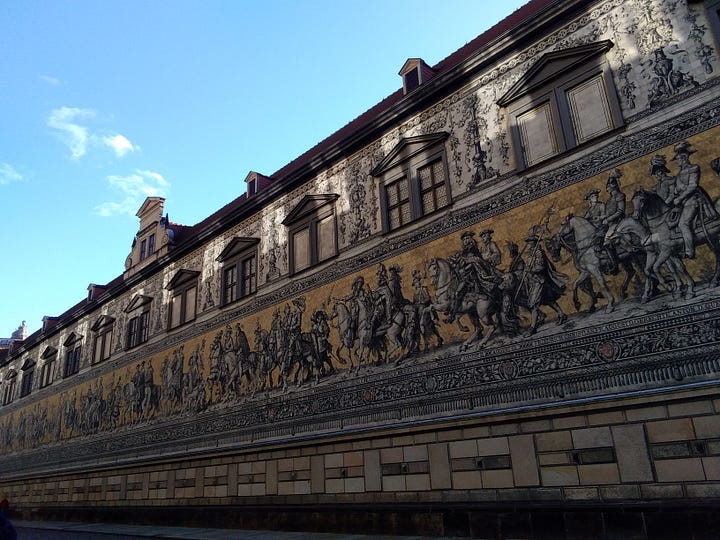
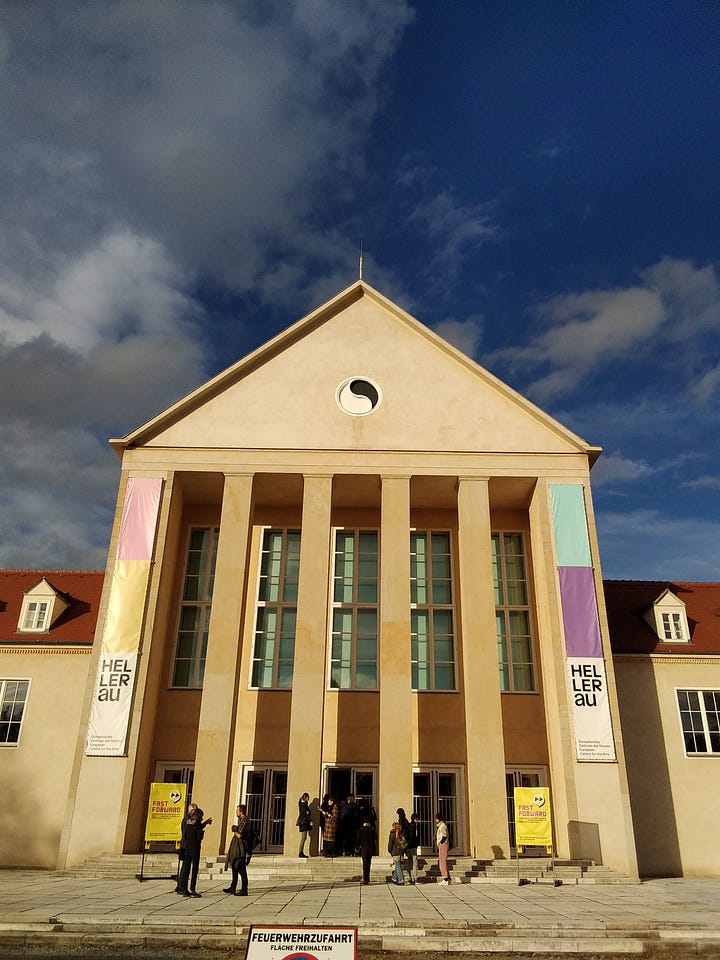
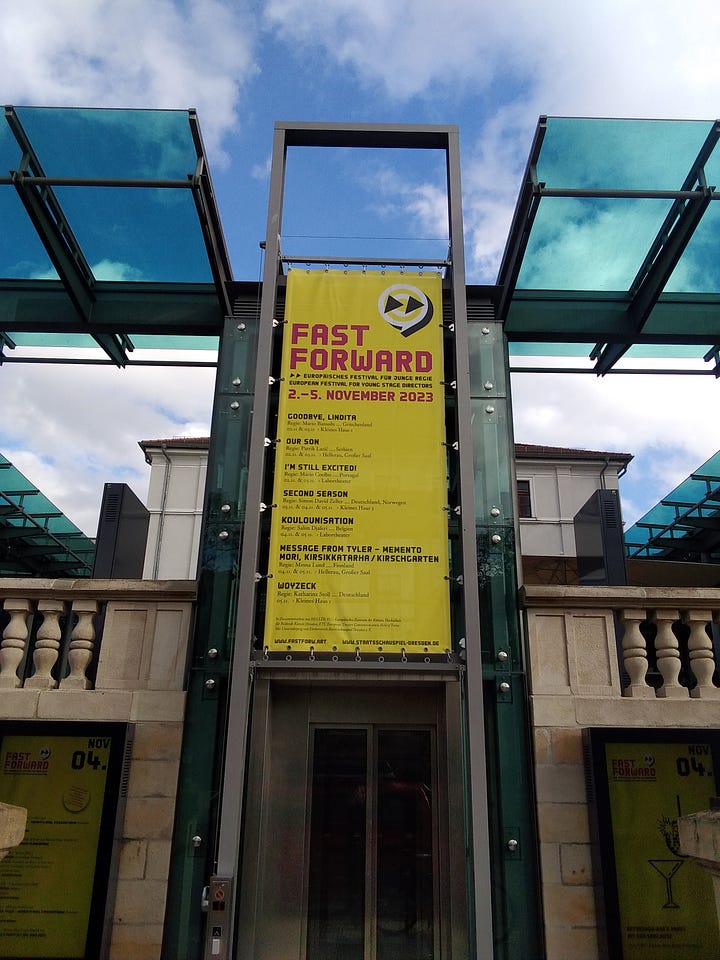
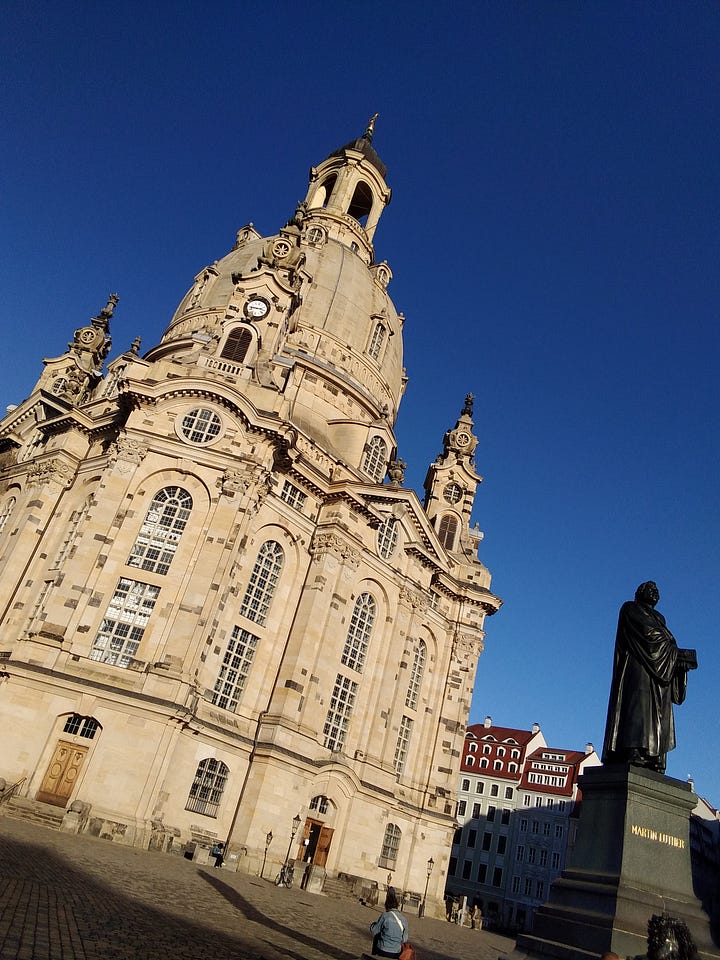
In case you couldn’t already tell, I found my experience at Fast Forward invigorating. The care which curator Charlotte Orti von Havranek puts into the programme is evident and the work was tonally varied, often visually rich, formally playful and driven by a sense of excitement about what theatre is capable of being and doing.
This week in European theatre
Each week I do a small round-up of festivals, premieres and other exciting upcoming events. If you have recommendations for this section, please do let me know.
Rausch 2- The second iteration of the perception-expanding festival at Theater an der Ruhr sounds exciting. Merging theatre, performance, dance and film with art installations, talks and parties, the festival sees artists taking over the entire building from backstage offices to boiler room to the roof space, to open up the building and the audience’s minds. It runs from 3rd -19th November.
The Last Generation, or 120 Days of Sodom – Milo Rau’s new production, a collaboration with Théâtre de Liège and Theater Stap, a Flemish company for actors with learning disabilities, uses Pasolini’s adaptation of a book by the Marquis de Sade for a typically confrontational production. It premiered at Théâtre de Liège from 5th November, where it plays until 9th ahead of a Belgian tour.
Festival TNB – Every November the Théâtre National de Bretagne holds a cross-disciplinary festival featuring theatre, dance, film and music. This year’s programme, which takes place between 15th and 29th November, includes Australia’s Ibsen award-winning Back to Back Theatre with The Shadow Whose Prey the Hunter Becomes – I interviewed the company about this piece for The Stage last year - Vincent Macaigne’s Before the Terror, a version of Richard III and Grand Palais, a music-infused piece about the suicide of Francis Bacon’s lover, George Dyer.
Thanks for reading! If you have any feedback, tips, thoughts or other comments you can reach me on natasha.tripney@gmail.com






